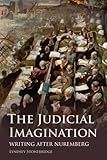The Judicial Imagination : Writing After Nuremberg / Lyndsey Stonebridge.
Material type: TextPublisher: Edinburgh : Edinburgh University Press, [2022]Copyright date: ©2011Description: 1 online resource (192 p.) : 2 B/W illustrationsContent type:
TextPublisher: Edinburgh : Edinburgh University Press, [2022]Copyright date: ©2011Description: 1 online resource (192 p.) : 2 B/W illustrationsContent type: - 9780748642359
- 9780748647057
- Arendt, Hannah, -- 1906-1975
- English literature -- 20th century -- History and criticism
- English literature -- 20th century -- History and criticism
- Justice in literature
- Law and literature -- History -- 20th century
- Law and literature -- History -- 20th century
- Literary Studies
- LITERARY CRITICISM / General
- 820.9355409045 22
- online - DeGruyter
| Item type | Current library | Call number | URL | Status | Notes | Barcode | |
|---|---|---|---|---|---|---|---|
 eBook
eBook
|
Biblioteca "Angelicum" Pont. Univ. S.Tommaso d'Aquino Nuvola online | online - DeGruyter (Browse shelf(Opens below)) | Online access | Not for loan (Accesso limitato) | Accesso per gli utenti autorizzati / Access for authorized users | (dgr)9780748647057 |
Browsing Biblioteca "Angelicum" Pont. Univ. S.Tommaso d'Aquino shelves, Shelving location: Nuvola online Close shelf browser (Hides shelf browser)

|

|

|

|

|

|

|
||
| online - DeGruyter Far from Heaven / | online - DeGruyter Framing Pictures : Film and the Visual Arts / | online - DeGruyter Heritage Film Audiences : Period Films and Contemporary Audiences in the UK / | online - DeGruyter The Judicial Imagination : Writing After Nuremberg / | online - DeGruyter Levinas and the Postcolonial : Race, Nation, Other / | online - DeGruyter Media and Memory / | online - DeGruyter The Nation and Nationalism in Europe : An Introduction / |
Frontmatter -- Contents -- Acknowledgements -- Illustrations -- Introduction. Gathering Ashes: The Judicial Imagination in the Age of Trauma -- Part I: Writing After Nuremberg -- 1. ‘An event that did not become an experience’: Rebecca West’s Nuremberg -- 2. The Man in the Glass Booth: Hannah Arendt’s Irony -- 3. Fiction in Jerusalem: Muriel Spark’s Idiom of Judgement -- Part II: Territorial Rights -- 4. ‘We Refugees’: Hannah Arendt and the Perplexities of Human Rights -- 5. ‘Creatures of an Impossible Time’: Late Modernism, Human Rights and Elizabeth Bowen -- 6. The ‘Dark Background of Difference’: Love and the Refugee in Iris Murdoch -- Bibliography -- Index
restricted access online access with authorization star
http://purl.org/coar/access_right/c_16ec
Tells the story of the struggle to imagine new forms of justice after Nuremberg.Returning to the work of Hannah Arendt as a theoretical starting point, Lyndsey Stonebridge traces an aesthetics of judgement in postwar writers and intellectuals, including including Rebecca West, Elizabeth Bowen, Muriel Spark and Iris Murdoch. Writing in the false dawn of a new era of international justice and human rights, these complicated women intellectuals were drawn to the law because of its promise of justice, yet critical of its political blindness and suspicious of its moral claims. Bringing together literary-legal theory with trauma studies, The Judicial Imagination, argues that today we have much to learn from these writers' impassioned scepticism about the law's ability to legislate for the territorial violence of our times.Key Features Returns to the work of Hannah Arendt as the starting point for a new theorisation of the relation between law and traumaProvides a new context for understanding the continuities between late modernism and postwar writing through a focus on justice and human rightsOffers a model of reading between history, law and literature which focuses on how matters of style and genre articulate moral, philosophical and political ambiguities and perplexitiesMakes a significant contribution to the rapidly developing fields of literary-legal and human rights studies
Mode of access: Internet via World Wide Web.
In English.
Description based on online resource; title from PDF title page (publisher's Web site, viewed 29. Jun 2022)


